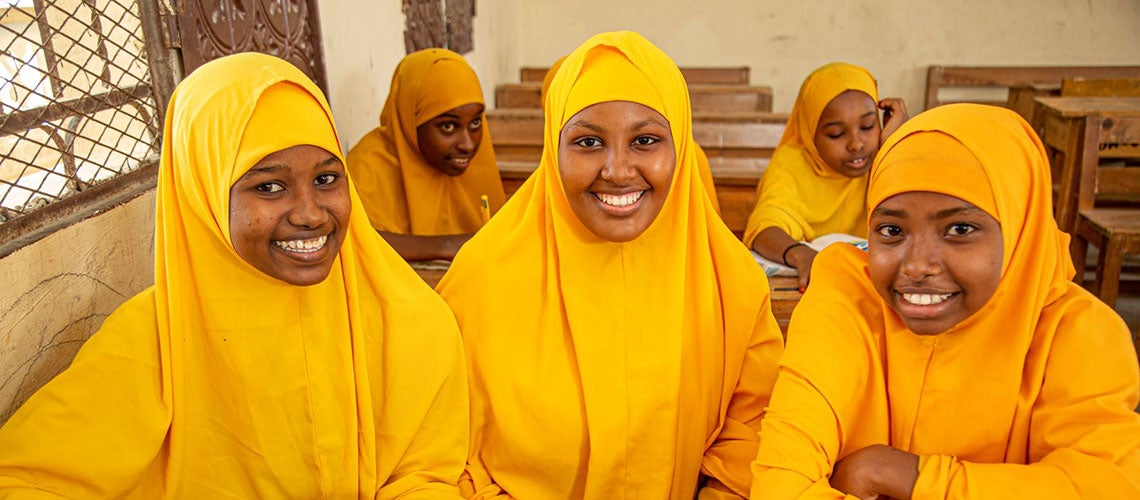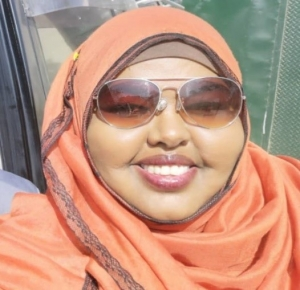 When we celebrate International Women’s History Month, we also celebrate the brave Somali women who are paving the way for the next generation of Somali female leaders. Photo: Mohamed Abdihakim, World Bank
When we celebrate International Women’s History Month, we also celebrate the brave Somali women who are paving the way for the next generation of Somali female leaders. Photo: Mohamed Abdihakim, World Bank
In 2012, Fawzia Yusuf Adam became the country’s first female Foreign Minister and then Deputy Prime Minister. Asha Haji Elmi, a peace activist, helped form the women’s network Sixth Clanto draw attention to the importance of women in the peace process. As a result, women were represented as an individual group in the peace talks for the first time. Ifrah Ahmad, experienced female genital mutilation; like almost 90% of young Somali girls. She refused to stay silent and joined voices of other Somali women advocating to end this violence with community-based solutions. Mama Hawa Aden Mohamed, founder of the Galkayo Education Centre for Peace and Development (GECPD), has created spaces where displaced women and girls, victims of all sorts of abuse and violence, can find safety, opportunity and be protected and sheltered. She has educated more than 1,000 women and girls in Puntland since 1994, despite being threatened and even shot at multiple times. For her courage, she was the recipient of the 2019 TRT World Citizen Educator Award and the 2012 UNHCR Nansen Refugee Award.
What do all these women have in common? They have overcome unique odds to have a voice in a largely male-dominated society. They say to the world: Somali women exist and our experiences, and our leadership matters in all the complex problems our country has to face. We are not limited to being mothers and homemakers. Throughout Somalia, phenomenal women are defying odds and breaking barriers.
We need to celebrate these phenomenal women who are defying odds and breaking barriers. Their leadership model can be an example for both women and men and young women aspiring and dreaming to make a change in their own communities. In the past decade, Somalia has made progress towards the institutionalization of gender equality. The introduction of quotas for women in 2012 led to a 14% increase of women representatives in the Upper House. The implementation of the National Development Plan 2020-2024 presented an added commitment to strengthen gender equality. The system is not perfect, but the quota has opened up the aspirations of women and normalized our role in public spaces and decisions that affect us.
In my years as an activist and storyteller, I have seen that Somali women approach leadership differently. They see leadership as an opportunity to serve both women and men, they often share power (see the networks of Somali women to understand this!), encourage vibrant diversity of thought which leads to stronger decision making and they often focus on their beneficiary group putting themselves last. This dedication creates a culture of trust that we so badly need in our public life today.
However, women still face social and cultural challenges. Women and girls’ leadership in public spaces (whether through politics, business, or the peace process) is still a privilege that has to be fought for every day. Women are still seen primarily as homemakers, to rear children and attend to domestic duties. Women have to overcome sexist stereotypes about women in the workplace, clan-based identity politics that center men, and deep-rooted gender-based violence. Barriers to education systematically exclude women from attaining skills. Certain social norms negatively impact women: for example, female genital mutilation which is extremely painful throughout a woman’s life, and the expectation to marry early. This limits women’ ability to aspire to breaking barriers and smashing the glass ceilings. In fact, one of the biggest causalities of gender inequality is that women themselves are scared to aspire to anything big, bold and ambitious. We make up 50% of this population just think what we could contribute in terms of ideas, resources, leadership and creativity!
I am happy to see slow gains in women’s political and civil society leadership in recent years. Various women’s groups and new movements contribute to a culture of challenging harmful gender norms and making it easier for women to participate in public life as full citizens. Leaders such as Fawzia Yusuf Adam remain an inspiration for a new generation of women leaders. They demonstrate women’s effectiveness in negotiating peace and learning lessons from our long-standing conflict that can lead to building a more equitable Somalia for everyone. More Somali women engaging in higher education can be some of the most powerful tools to delay early child marriage and enable women to be leaders in their own right. In addition to playing active roles in civil society, public service, private sector and political leadership, Somali women have also contributed to the expediting process of peacebuilding in Somalia. Women’s peacebuilding efforts encompass supporting societies as much as supporting individual women’s rights. Solving the issues of violence and insecurity against women is key to transforming social structures for men and women, gender acceptance and behavioral changes.
But more still needs to be done. To achieve lasting peace between communities, it needs to be easier for women to participate in leadership, not just in politics but also in civil society and the private sector. Young women, in particular, need to be encouraged and programs put aside to promote their leadership and, schools, specifically, have an important role in fostering leadership skills for young girls. We need to urgently address the fact that girls are more likely to drop out of school due to poverty, female genital mutilation, early marriage, expectations that girls will support domestic labor at home. In the past 13 years, I have witnessed first-hand how effective programs such as life skills training, public speaking and debating skills can be for female students.
Every woman and girl has the capacity to occupy public life and promises to contribute to her family, society and the economy in Somalia. When we celebrate International Women’s Month, we also celebrate the brave Somali women who are paving the way for the next generation of Somali female leaders. This is the time for acknowledging re-echoing and amplifying women's achievements. This is the time to make it easier and normal for women to participate in public life.
This blog is part of a blog series curated by the World Bank’s Somalia Women’s Empowerment Platform that highlight evidence and solutions on women’s and girls’ empowerment in Somalia. Read more blogs in the series:


Join the Conversation